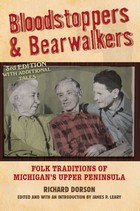

Folklore as it comes from the mouths of living storytellers has a matchless authority and conviction. Richard Dorson, living for five months among the Indians, Finns, Canadiens, Cornishmen, lumberjacks, sailors, miners, and sagamen of the Upper Peninsula of Michigan, has listened to their tales, which this book reproduces with all their native thunder and salt. With this lively evidence he proves that America still has its myth-makers and purveyors of myth, who represent, both ethnically and historically, an enormous range of traditional oral folklore.
We meet the Chippewa and Potawatomi Indians, who tell their own heroic versions of the wars with the white men, and whose chief delight is to relate the adventures of the folk hero, Winabijou. For them, as for the French-Canadians and Finns, magical beliefs have been part of their daily education and entertainment. Each group has its own version of European folk tales: the old fairy stories find new form as dragons are conquered with razors and soap, and giants talk in the idiom of the backwoods and pioneer towns.
Some of these myths center around imaginary and semi-imaginary folk heroes; others spring from local politics, and even more from local occupations. The woods tales of lumberjacks, the tragic mysteries of the mines, the weird adventures on the Lakes, each kind of tale has its representative teller. Sometimes the raconteur's most exciting fables concern his own wonderful exploits—with women, drink, and wicked employers. Rooted deep in storytelling tradition, these tales hark back to the frontier and immigrant past of an America shaped by many peoples with extraordinary experiences.
Mr. Dorson provides, in his introduction, a simple account of the idea behind the book and his methods of procuring the tales, in concise and closely written notes at the end of the book he furnishes annotations to the tales which should satisfy and stimulate every folklorist, professional or otherwise. Mr. Dorson did much of the fieldwork for this book under a Library of Congress Fellowship; he has also held a Harvard Sheldon Traveling Fellowship, a Guggenheim Fellowship, and a Faculty Study Fellowship from the American Council of Learned Societies.
READERS
Browse our collection.
PUBLISHERS
See BiblioVault's publisher services.
STUDENT SERVICES
Files for college accessibility offices.
UChicago Accessibility Resources
home | accessibility | search | about | contact us
BiblioVault ® 2001 - 2024
The University of Chicago Press









